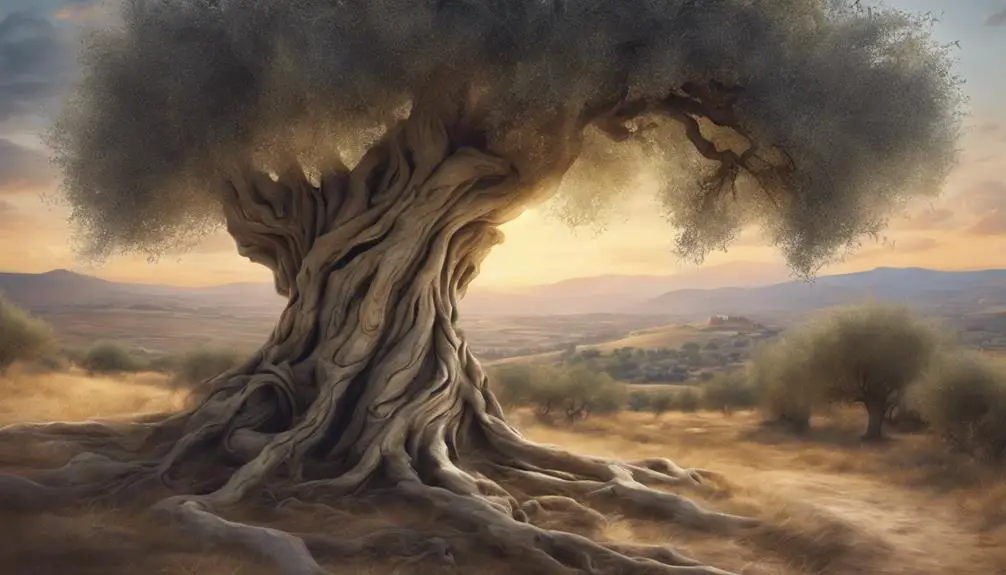Curious about the symbolic significance of trees in the Bible? Discover the hidden meanings behind these arboreal references in this enlightening exploration.

Are There Bible Verses About Trees
You might think the Bible is chock-full of stories about people, places, and prophecies, but have you ever considered how often trees crop up in its pages? Whether it's the iconic Tree of Life in Genesis or the mustard seed parable in the New Testament, trees are woven into the biblical narrative in surprising and insightful ways.
What might these arboreal references tell us about life, faith, and our relationship with the natural world? Hold onto your curiosity, as we're about to embark on a fascinating exploration of tree symbolism in the Bible.
Key Takeaways
- Trees in the Bible symbolize spiritual growth, wisdom, and interconnectedness, highlighting profound spiritual truths.
- The Old and New Testaments use tree metaphors to explore human nature, God's divine wisdom, and spiritual transformation.
- Notable Bible verses like Genesis 2:9 and Matthew 13:32 use tree imagery to underscore themes of life, righteousness, and faith.
- Lessons from biblical trees such as the Olive, Fig, and Tree of Life encourage self-reflection on spiritual growth, resilience, and eternal salvation.
Understanding Tree Symbolism in the Bible

Delving into the biblical narrative, you'll find that trees hold significant symbolic value, often serving as metaphors for spiritual growth, prosperity, and the interconnectedness of life and faith. They aren't merely passive elements in the narrative, but active participants in conveying deeper spiritual truths.
Trees are frequently depicted as a life source, nourishing and sustaining both man and beast. They also symbolize wisdom and knowledge, as seen in the Tree of Knowledge of Good and Evil in Genesis. Furthermore, trees are often used as symbols of longevity and resilience, as they withstand various seasons and weather conditions.
In the New Testament, tree symbolism evolves to convey redemption and salvation, most notably represented in the cross upon which Jesus was crucified. This wooden structure, derived from a tree, becomes a symbol of sacrificial love, redemption, and the transformative power of faith.
In analyzing this symbolism, you'll gain a deeper appreciation of the biblical narrative and its intricacies. The symbolism of trees in the Bible is a testament to the profound interconnectedness of all life, a concept that's as relevant today as it was in ancient times.
Trees in the Old Testament

Building on this understanding of biblical tree symbolism, let's now turn our attention to specific references to trees in the Old Testament and examine their contextual significance. Trees are mentioned ubiquitously throughout the Old Testament, often symbolizing life, prosperity, and the presence of God.
One key instance is found in Genesis 2:9 where two specific trees are mentioned: the tree of life and the tree of the knowledge of good and evil. These trees serve as pivotal symbols of human choice, divine prohibition, and the consequences of disobedience. Similarly, in Jeremiah 17:8, the righteous person is compared to a tree planted by the water, illustrating the spiritual vitality and resilience of those who trust in God.
Trees also function as metaphors for nations and individuals. For instance, Nebuchadnezzar's dream of a great tree in Daniel 4:10-12 signifies his own rule and its eventual downfall.
Further, the Old Testament's use of trees in ritual and worship, as in Leviticus 23:40, underscores their sacred value. These examples demonstrate how trees in the Old Testament aren't mere vegetation but carriers of profound theological and moral lessons.
Trees in the New Testament

Pivoting towards the New Testament, you'll discover that trees continue to hold significant symbolic value, often serving as metaphors for spiritual growth and transformation. They're not only mentioned in literal terms but also bear profound metaphysical meanings.
The mustard seed parable narrates the tiny seed's growth into a large tree, symbolizing faith's potentiality. The fig tree, too, holds importance, with Jesus Christ using it to depict spiritual barrenness.
Intricately woven into narratives, these tree references help illustrate complex spiritual truths. They're not merely ornamental but indeed instrumental in conveying the Gospel's thematic depth.
Let's examine a couple of New Testament verses featuring trees:
Verse |
Analysis |
|---|---|
Matthew 13:32 |
The smallest of all seeds, yet when it grows, it's the largest of garden plants and becomes a tree, illustrating faith's growth. |
Luke 21:29-31 |
Jesus uses the fig tree to signal the proximity of God's kingdom. |
Matthew 3:10 |
A warning of judgment, the tree that doesn't bear good fruit will be cut down. |
Mark 11:21 |
Jesus curses a barren fig tree, symbolizing spiritual fruitlessness and judgment. |
Parsing these verses, you'll notice the profound symbolism trees carry, enabling a more profound understanding of the New Testament's spiritual teachings.
Notable Bible Verses About Trees

Moving beyond the New Testament, let's explore some of the most notable Bible verses about trees, highlighting their symbolic significance across both Old and New Testaments.
In the Old Testament, the book of Genesis prominently features the Tree of Life and the Tree of Knowledge of Good and Evil (Genesis 2:9). These trees represent life, wisdom, and moral discernment – pivotal themes in Christian theology. Likewise, Psalm 1:3 employs the metaphor of a tree planted by streams of water, symbolizing the righteous person who thrives under God's guidance.
In the New Testament, the barren fig tree in Mark 11:12-14 stands as a stark warning against spiritual fruitlessness. Moreover, Revelation 22:2 refers back to the Tree of Life, now situated in the New Jerusalem and bearing fruit for the healing of nations.
These verses indicate that trees aren't just background scenery in Biblical narratives. They're imbued with rich symbolism, serving as potent metaphors for spiritual concepts. This nuanced use of tree imagery underlines the Bible's profound exploration of human nature, divine wisdom, and spiritual growth.
Spiritual Lessons From Biblical Trees

Delving into the spiritual lessons drawn from Biblical trees, it becomes clear that they serve as profound metaphors, teaching us about faith, resilience, and the importance of bearing spiritual fruit. Like trees, you're meant to grow and flourish spiritually, to bear good fruit, and to weather the storms of life. The olive tree, for instance, symbolizes peace and God's enduring love. It's resilient, able to thrive even in harsh conditions.
Consider the fig tree, which Jesus cursed for bearing no fruit. This can be seen as a warning: you're not merely to exist, but to be fruitful in your spiritual life. Conversely, the Tree of Life in Revelation provides healing and eternal life, depicting God's promise of eternal salvation.
To help you contemplate these lessons, here's a table summarizing these tree metaphors:
Biblical Tree |
Spiritual Lesson |
|---|---|
Olive Tree |
Symbol of peace and God's enduring love |
Fig Tree |
Call for spiritual fruitfulness |
Tree of Life |
Promise of eternal salvation |
These metaphors encourage self-reflection, asking you to assess your spiritual growth and resilience, and to strive for spiritual fruitfulness.
Conclusion
In essence, trees in the Bible offer profound spiritual lessons and truths. They serve as symbols, foreshadowing events, and emphasizing teachings in both the Old and New Testaments.
Reflecting on these notable verses can deepen your understanding and appreciation of biblical truths. So, next time you come across a tree in your readings, remember, it's not just about the bark and leaves, it's about the underlying spiritual meaning.



Sign up